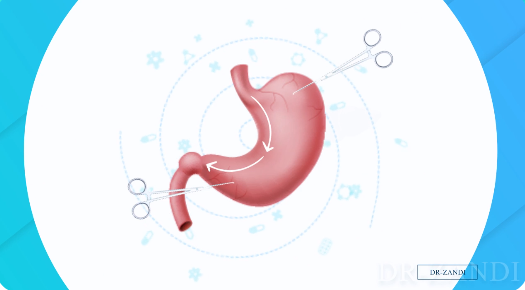
Different Types of Weight Loss Diets
In modern life, one of the biggest concerns for individuals is weight gain and finding methods to reduce it. The reasons that have led to
The experience and frequency of surgery leads to mastery, and the lack of complications after surgery for patients shows the doctor’s commitment to the patient. Dr. Abdullah Zandi, with more than 24 years of experience in the field of bariatric surgery, and using the most up-to-date American equipment and according to the anatomy and genetics of each person, performs his surgeries in order to not only maintain the health of the patient, but also reduce the complications caused by the surgery. At least as much as possible.



Gastric sleeve surgery or stomach reduction surgery is one of the types of surgeries known as bariatric surgeries in the treatment of people suffering from obesity and overweight.
In this method, generally 70-80% of the stomach volume is removed during surgery and a banana-shaped piece of the total stomach volume remains.
Weight loss surgery, also called bariatric or metabolic surgery, is used as a treatment for obese and very obese people.
This surgery can lead to significant weight loss and help improve many conditions related to obesity, such as type 2 diabetes, high blood pressure, high blood fat, metabolic syndrome, back and joint pain, etc.
But it should be noted that bariatric surgery is a major surgery and, in most cases, should be considered only after trying to lose weight through a healthy diet and exercise.
By entering your height and weight, you can calculate your body mass index and use the image in this section to find out your condition.
After surgery, you will be given a diet plan to follow.
This schedule varies from person to person, but a typical schedule can look like the one below:
First few days: water and liquids (eg, thin soup)
First 4 weeks: watery and liquid food (for example, yogurt or pureed food)
Weeks 4 to 6: Soft food (eg, mashed potatoes)
Week 6 onwards: Gradually return to a healthy, balanced diet
All types of weight loss surgery can help with significant weight loss, but each has its pros and cons.
For example:
You usually lose weight faster after gastric bypass or sleeve gastrectomy than after gastric banding.
More people tend to lose weight with a gastric bypass or sleeve gastrectomy than with a gastric band.
The risk of serious surgical complications is generally higher for gastric bypass or sleeve gastrectomy.
Gastric bands are removable, so the procedure can be reversed if serious problems develop.
If you are considering weight loss surgery, talk to your surgeon about different techniques to decide which one is best for you.
These assessments may include examining the following:
Physical health using blood tests, imaging and…
Diet and eating patterns
Mental health, such as asking about your expectations of surgery and whether you have any mental health conditions. The reason for this evaluation is whether you can cope with the long-term lifestyle changes required after weight loss surgery.
You may be advised to eat a calorie-controlled diet in the weeks before surgery to help reduce the size of your liver. This can make surgery easier and safer.
Women are usually advised not to become pregnant during the period of significant weight loss in the first 12 to 18 months after surgery.
This is because weight loss surgery can affect your vitamin and mineral levels. If the level of these substances in your body is low during pregnancy, there is a risk that it will harm your baby.
It’s better:
Use contraception until it is safe to become pregnant. Ask your doctor about the best type, as some are not suitable for women who have had weight loss surgery (including birth control pills and birth control injections).
Talk to your doctor if you get pregnant right after surgery or if you plan to get pregnant at any time after surgery. They can check your vitamin and mineral levels and recommend supplements (learn about vitamins and nutrition in pregnancy).

In modern life, one of the biggest concerns for individuals is weight gain and finding methods to reduce it. The reasons that have led to

Multiple endocrine neoplasia type 1 (MEN-1) is a rare inherited autosomal dominant disease which manifests itself with at least one clinical scenario before 45 years

One of the important pre-pregnancy measures is weight loss, weight control and staying within a healthy weight range, which results in the health of the